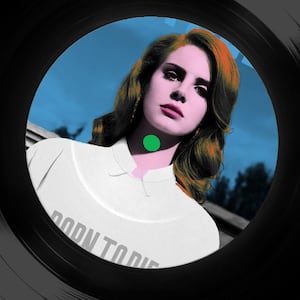A track on Lana Del Rey’s long-windedly titled ninth studio album, Did You Know There’s a Tunnel Under Ocean Blvd, has launched the singer’s massive fanbase into a frenzy. The song, “Judah Smith Interlude,” is—who could’ve guessed it—a spoken-word interlude by Churchome mega-church preacher Judah Smith.
Smith, who has been with Churchome since his father, Wendell Smith, founded the ministry in 1992, has long been criticized for his anti-abortion and homophobic stances. In a 2005 interview, Smith called homosexuality a sin and likened it to “murder, rape, or living with your girlfriend.” In more recent years, Smith has become known for being more of an influencer than a preacher. He’s buddied up to famous figures like Justin Bieber—who left Hillsong Church, where Smith is also a contributor, in 2019—and typically sports big, trendy glasses frames on his Instagram account, which boasts over 700,000 followers.
“Judah Smith Interlude” is a nearly five-minute-long recording of one of Smith’s sermons, accompanied by a lilting piano from producer Jack Antonoff. The sermon seems to have been recorded by Del Rey herself, perhaps at one of the services she’s attended at Churchome’s Los Angeles chapter. On the track, Smith refrains from any incendiary remarks about hot-button societal issues and instead rambles on about love, kids, marriage, and of course, God. Still, his presence on the album has confounded Del Rey’s fanbase, a large portion of which identifies as queer.
“It’s giving conversion therapy cult leader,” one fan said on Twitter. Another asserted, “You’ve gotta be a whole other level of gay and religiously traumatized to sit through four minutes of this shit,” referencing a meme that has been permeating the platform for the last couple of weeks.
While Del Rey’s fanbase is understandably upset about a mega-church preacher getting a sizable chunk of time on her album to spew his meandering religious rhetoric, it’s important to examine the context of the song within the record. Del Rey has always been an artist wholly committed to her own self, spilling whatever complex emotions she’s feeling at the moment into intricate, aloof songwriting. That often means saying the wrong thing and then putting her foot in her mouth when trying to backtrack or clarify.
“Judah Smith Interlude” appears on Ocean Blvd immediately after a song called “A&W,” which, no, is not named after the fast food chain that serves hush puppies and root beer. To Del Rey, “A&W” is an abbreviation for “American Whore,” and the song finds her examining herself in the past, present, and future, twisting those parts of her identity into a mangled investigation of the eras of her career. The result is a compelling, seven-minute, stylistic switch-up that lampoons her own commodification—and all of the personas that fans and critics have thrust onto her: the damsel in distress, the victim of violence, an empowered icon, a faux-religious dilettante whose best friend is Jesus.
Examined against “A&W,” “Judah Smith Interlude” plays as wholly ironic. Del Rey is exactly the type of person who would attend a celebrity-studded mega-church, both for a cleansing of the soul and to lambaste its intrinsic flamboyance with her friends. She’s doing exactly that with this song; throughout Smith’s sermon, Del Rey and her pals can be heard laughing as Smith winds around his point.
Talking about God as a massive, all-powerful being, Del Rey mumbles, “yeah, yeah” with an acid-tongued, winking sarcasm. Other times, she can’t help but hold back her distaste for Smith’s cringy absurdity. When Smith refers to God as the “rhino designer,” Del Rey and her friends giggle and jokingly question, “rhino designer?”
But what really drives this home is how Del Rey uses the interlude as a means to an end. The excerpt of Smith’s sermon ends with the preacher discussing his own career in a larger, existential setting: “I used to think my preaching was mostly about you,” Smith says. “I’ve discovered my preaching is mostly about me.”
This ending point frames the song not just within the context of Del Rey’s new record, but her entire career. Ever since her first album, Born to Die, was released in 2012, her fanbase has narrowed significantly from those who loved her Top 40-adjacent, hip-hop sad girl persona to those who prefer the delicate, trippy poetry of her more recent (and much more divisive) work. In the 11 years since her debut, the singer has taken control of her own career and harnessed a cult fanbase into carte blanche for her entire artistry.
Del Rey’s preaching is no longer about speaking to anyone else’s sensibilities or relating to the masses. It’s about finding a grounding point for herself. And while “Judah Smith Interlude” might be a point of contention for fans, it’s ultimately an ironic and inflammatory sendup of commodified spirituality and a reminder that Del Rey’s artistic ethos is firmly about pleasing no one but herself.






